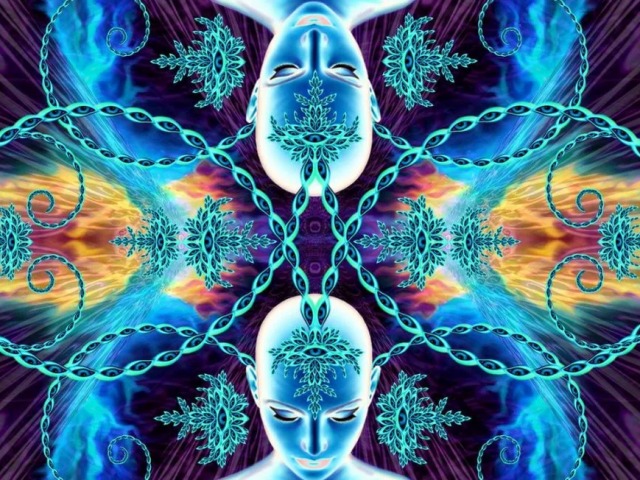In this article you will find a description of what neoamage and magical thinking are. You will also learn how to get rid of and overcome.
Content
- Meta magical thinking and neoamage: what is it and when did it appear?
- Magical thinking in psychology, psychiatry: aspects
- Magical thinking and neo -omal Narcissus: Freud
- Magical thinking and okr: how to get rid, how to overcome?
- Belief in fate, like magical thinking: neo -amal these days
- Magical thinking, psychosis, schiza: where is the origins?
- Magic thinking: Examples
- Video: Alexander Panchin. Fundamentals of magical thinking.
The observer of life in the modern world notes many examples of statements and texts, as well as the behavior and relationships of people who contain magical and irrational elements. They resemble practices mistakenly regarded as attributes of past times and primitive tribes.
All these phenomena, called neo -magnemias and neo -magno -magnesium thinking, are the activity of the mind, thanks to which these practices are so common. This is a normal and natural part of human life. Read more about what magical thinking and neoamage are below.
Meta magical thinking and neoamage: what is it and when did it appear?

The word "magic" in spoken language is most often associated with spells or mysterious procedures performed by witches or sorcerers. People resort to ritual customs of ordinary mortals to get kindness and support from secret forces - this is magical thinking.
- From the very beginning of the history of mankind, people want to use mysterious forces to influence life, peace and other people.
- There are people who make spells, and people who are fascinated.
- We can observe nemagia in the hospital and in politics, in art and in the field of entertainment, in the media and in the activities of large social groups.
When neo-magical thinking appeared:
- The systematic study of the phenomenon of magic, as a way of exerting influence, began to develop only at the beginning 20th century.
- It concerned primarily primitive tribes that still lived in the regions of the world, which Western civilization has not yet reached.
Now meta magical thinking can be found in almost every person. What is it connected with, let's figure it out further.
Magical thinking in psychology, psychiatry: aspects

The roots of the practice of magical thinking achieve the experience of human powerlessness in the face of difficult events and situations. Here are aspects of magical thinking in psychology and psychiatry:
- When the knowledge, the experience acquired in the past, and practical skills fail, a feeling of helplessness arises.
- A person begins to feel concern, fear and desire to change his position for the better.
- Therefore, he takes replacing actions that give imagination, stimulated by fear, desires and hope.
- They include symbolic, metaphorical or approximate reproduction of the desired goal and action.
All this helps a person in this way:
- The implementation of replacement actions helps a person overcome a sense of helplessness and gain a sense of hope.
- He begins to experience direct contact with the vision of the fulfillment of desires created in his imagination.
- Examples of the widespread use of such activities can be found in all cultures and historical periods.
- This is possible thanks to the special function of our mind, called magical desire.
- It all depends on the ability of a person to deeply and firmly believe in the reality of the vision of the required states and situations created under the influence of strong desires and fears.
- Magical thinking is considered by psychologists as one of the early forms of development of cognitive processes and is common in childhood of each person.
Such thinking is accompanied by a feeling that thinking about something is the same as doing it. That you can have a direct impact on the facts of life, simply reflecting and discussing them, without even taking physical actions in relation to them.
Magical thinking and neo -omal Narcissus: Freud

If you talked with the true daffodil, you probably noticed that the main aspect for such a person is neo -amal and magical thinking. More about who you are narcissus or EgoistAnd how he relates to people, read the article on our website.
Here are aspects of magical thinking according to Freud:
- In certain circumstances, such as forms of mental disorders, stressful situations that pose a serious threat to a person, or the emotional experience of an act of artistic creativity, magical thinking can get a dominant role in the work of the mind.
- People use both of these functions of the mind depending on the circumstances, and irrational thinking is largely “manual” and obeys the principles of reality and logic.
- Since this helps to increase the sense of strength and subjective control over their own life, it is still attractive to all of us.
- Without this ability, many people who are in particularly difficult personal situations would be subject to fear, despair, confusion and loss of hope.
A special role in exciting magical thinking is played by situations and actions that undermine trust in logical thinking and cause people a sense of disorientation and helplessness.
Interesting:
- A delicious environment for neo -omage can also be an excessive number of symbolic and oral declarations in social life and their abuse with a deficiency of real affairs.
- A special variety of verbal-symbolic unreality is created, in which the differences between what is only said, and what is actually done, is blurred.
This is the secret to the success of magical thinking:
- An important part of magical desires is a belief in the existence of powerful sources of power.
- They can be used to achieve your own goals.
- Secret knowledge of how to use these sources is also important.
- Since the replacement action arising from this knowledge also allows you to express desires and fears, it facilitates the liberation from a sense of powerlessness and strengthens hope for success.
Thus, from a subjective point of view, it can have the value of real actions and cause belief in its own effectiveness associated with obtaining complicity in a powerful source of power and using appropriate practices.
Magical thinking and okr: how to get rid, how to overcome?

It is believed that magical thinking is inevitably part in people with Okr (obsessive-compulsive disorder). They are confident in the following:
- In different circumstances, the same magical rite can cause opposite effects in a person with disorders. For example, pouring water on a burning branch, you can cause rain or stop it, depending on whether we concentrate on the evaporation of water or on the extinguishing of a fire.
- A person is also sure that with the help of a spell, he can kill or save his life.
- Sympathetic magic creates the conditions in which mysterious forces are forced to move from one to another, using manual and oral rituals.
- Creative magic creates new properties and most often occurs orally, for example, by applying spell on incorrect wives.
All this happens because:
- Since time immemorial, symbolic actions and expressive gestures are important tools used to solve various life problems.
- They can create, as in the case of primitive peoples studied by ethnographers, compact magic systems that regulate a significant part of the tribal life.
- They often existed in parallel with the system of practices and religious beliefs.
Answering the question of how to get rid of the OCD and overcome magical thinking, you should focus on the following:
- There is a tradition of atheistic analysis of all phenomena, when the limits are considered insignificant, and religion itself is considered as a transformation or change in magical practices.
- This is a serious misunderstanding. Both the old and new neo -magno -magic methods primarily serve to obtain influence and control over individual areas of life and the world.
- The achievement of magical sources of power or magical strengthening of real existing forces is aimed at increasing the efficiency of actions.
- Using the magic once and today neo -Magia, people want to have more influence and power over things, other people and life situations.
It must be remembered that in addition to magic, also along with it, there is both religion and atheism. Therefore, if a person has plunged and has only magical thinking, you need to show him the other side of life, for example, take it to the church or tell about atheism. Psychologists also use other methods that are also effective. Therefore, it is better for a person with OCD to contact a specialist: a psychotherapist, psychiatrist or psychologist.
Belief in fate, like magical thinking: neo -amal these days

Religious phenomena have a completely different nature. It seems that the essence of religious experience is the spiritual and direct meetings of a believer with God, which are self -incentive actions. Each of us believes in his fate. But many are sure that man was created by God and how to live life is already written from above. Each person has his point of view correct for him, therefore it is impossible to name faith in fate by truly magical thinking. In addition, it should be noted:
- For all believers, meetings with God are not aimed at improving the efficiency of their own actions and obtaining specific material benefits.
- Their main goal is achieved by the very fact of the experience of the presence of something from above, love and good.
- They primarily satisfy the need for personal contact and are not an expression of desire for power.
- For a person who deeply believes in significant experience, this is the subordination of God's power and the trust of his life by a divine will.
Of course, there are cases that the religious practices of some people are accompanied by neo -magical actions, such as agricultural rituals with pagan pedigree, which support the abundance of grain crops. However, they should not be identified with religion.
Nowadays, nemagia is often "jokes":
- There are no serious examples of using magical actions as a tool to combat other people.
- An important role in the popularization of traditional forms of neo -omagi plays the media.
- The media are increasingly published by the products of neo -magno -magic thinking and reports of paranormal phenomena and events in the hope of expanding the circle of readers or spectators.
Many people tend to succumb to the magic of a printed word and often are too serious about frivolous publications.
Magical thinking, psychosis, schiza: where is the origins?

Neo -magnogger practices and features of thinking are increasingly becoming the subject of market operations. Neomagia becomes an attractive product or an effective tool used by people to buy certain goods.
More and more people are provided by nemagic services located on the border medicine, psychology and technology. They accept paraprofessional associations and try to give these practices a scientific rationale. Therefore, this is how magical thinking, psychosis and schiz. Where the origins come from:
- The advertising business developed very quickly.
- Therefore, as in other capitalist countries, this stimulated neo -magnalized thinking with impressive images in order to obtain control over the awareness and ignorance of consumers and manipulate their purchase decisions.
- Advertising masters are much more professional and effective than their primitive predecessors, propagandists of the past system, also trying to control people's minds, although without much success.
- Seduced and fascinated by hopes for family happiness, professional success, success with the opposite sex, eternal youth, we buy new brands of washing powders, shampoos, food products, etc.
We do not have so much experience with another type of neo -amage associated with the presence of charismatic political or social leaders in public life.
Remember: Too frequent and wide appeal to uncontrollability reduces the ability to exercise real control over the course of events and facilitates the task of those who are able to create illusions about their strength and wisdom. It also limits the willingness to look for less attractive, but more real ways to solve problems.
Magic thinking: Examples

Children often notice supernatural and not causal relationships between the sphere of desires and external reality: "If I really want something, this should happen." They are convinced of the existence of relationships between various things and phenomena that cannot be reasonably explained by natural reasons. Also, kids consider random mental associations as irrefutable evidence of the existence of these connections.
The thinking of children is the most striking example of nemagia:
- In children, the boundaries between the real world and the world of fantasies come into contact with the same sense of reality.
- They deeply believe that there are some hidden forces.
- The child’s mind is very tolerant of the coexistence of conflicting judgments and avoids the duration of logical reasoning.
- These natural magical and desirable mental abilities are subjected to intensive and systematic corrective actions in modern man, introducing new rules of thinking and streamlining the mind.
- However, the rational formation of the child’s consciousness through the influence of the school, parents and the world of adults, fortunately, does not eliminate this original function of the mind.
Therefore, adults also use the ability to think to the desired, although this is done under a much greater control of the rational logical function of the mind.
Video: Alexander Panchin. Fundamentals of magical thinking.
Read on the topic:







